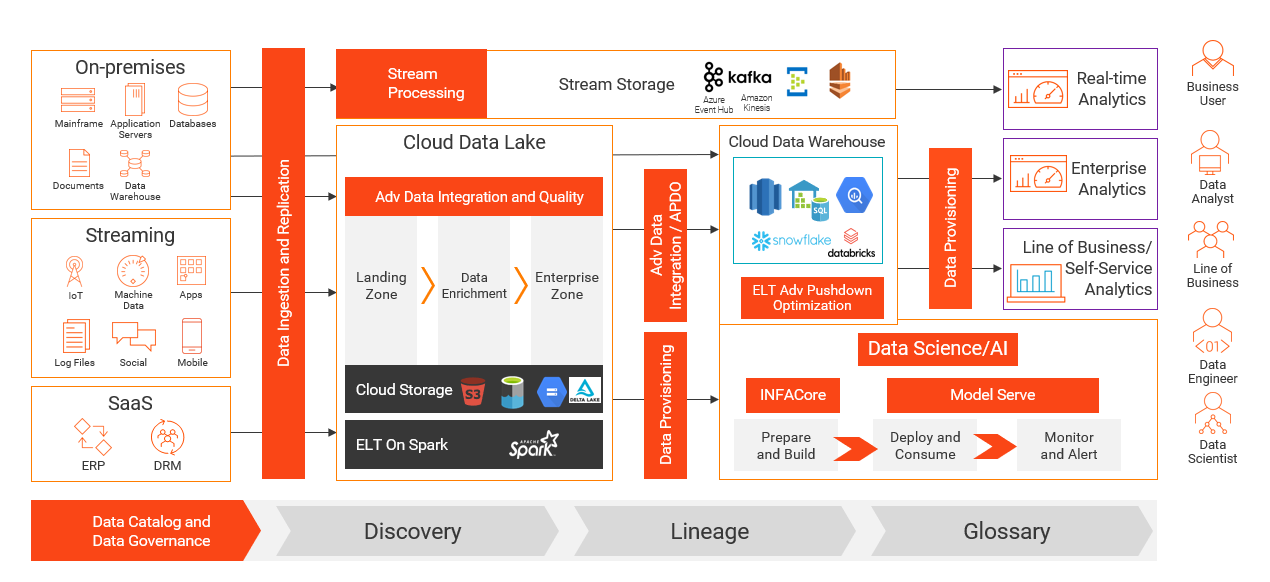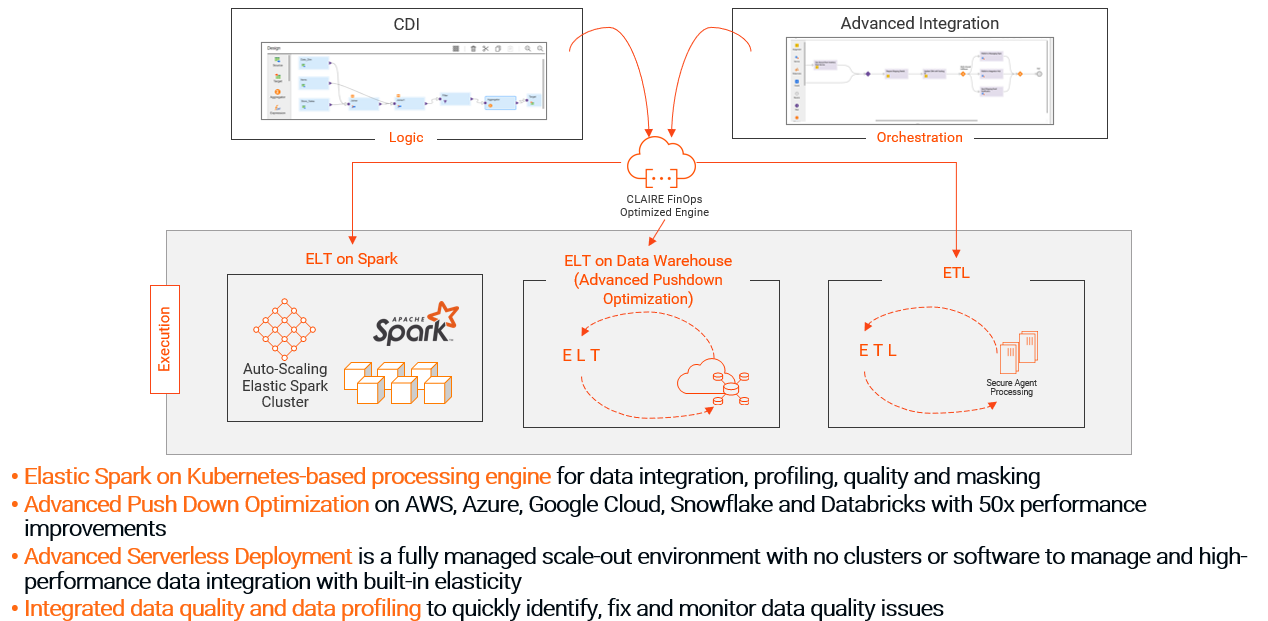How Data Engineering and Modern Data Architectures Power AI Innovation

The influence of artificial intelligence (AI) has garnered the attention of organizations worldwide. And given that AI success is dependent on the health of your data, you must ensure it is holistic, trusted and governed. If you don’t, you can run into inaccurate or biased predictions — not ideal given today’s competitive climate.
Because data quality is so intertwined with data engineering, it’s imperative that certain practices be established to proactively address these issues. And it won’t get any easier: Recent reports state that 2.5 quintillion bytes of data are generated globally each day.1 This underscores the need for solutions to navigate and derive value from vast datasets to help drive AI innovation. It’s important to recognize the ongoing challenges data engineering faces in unlocking the full potential of data for better decision-making:
- Data variety and complexity concerns for diverse data sources, structures and formats
- Scalability and performance issues for increasing volume and velocity of data
- Real-time processing demand for real-time insights
- Adaptability to varying workloads and evolving business needs
- Data integration issues when dealing with disparate systems
- Data quality problems like inconsistencies throughout the data lifecycle
Being able to address these challenges brings up why you need modern data architectures. Two reasons off the top of my head? Their ability to adapt to changing data landscapes and scale resources as needed. Another benefit of modern data architectures is their ability to support real-time processing, which enables seamless integration and unification of diverse datasets…not to mention they help enhance performance and enforce data integrity. The bottom line: To help resolve data engineering challenges, you must adopt modern data architectures to ensure you’re making meaningful data-driven decisions.
Let’s review this concept in more detail.
How Data Engineers Empower AI Excellence: The Central Role of Data Engineering and Modern Data Architectures
The success of your AI journey hinges on the critical roles played by data engineering and modern data architectures. Data engineering is your gateway to diverse, high-quality datasets necessary for effective AI model training. Plus, data engineering involves feature engineering, a process that transforms raw data into meaningful features critical for predictive capabilities. In parallel, modern data architectures facilitate the seamless integration and consolidation of data from diverse sources, improving model performance. These architectures are equipped to handle real-time data processing, adapt to varying workloads and scale for managing large datasets.
Additionally, modern data architectures enforce robust data governance, ensuring data integrity and regulatory compliance — essential aspects of responsible AI deployment. Together, they form the foundation for unleashing AI’s full potential across different industries.
Now that we have a better idea of how data engineering and modern data architectures work together to help drive AI success, let’s walk through how Informatica can help in these critical processes.
The Role Informatica Plays in Streamlining Data Engineering and Modern Data Architectures
Informatica can help enhance AI development by streamlining data engineering and modern data architectures. And that’s because Informatica Intelligent Data Management Cloud (IDMC), our AI-powered, robust data management platform, provides capabilities that help ensure efficient data flow across diverse sources. Some key IDMC capabilities that help simplify data engineering and modern data architectures include:
1. Data integration and mass ingestion, which help ensure that AI systems have access to diverse and voluminous datasets. IDMC also offers robust solutions for efficient data integration across diverse scenarios. Figure 1 illustrates how IDMC can help seamlessly support both ETL (extract, transform, load) and ELT (extract, load, transform – advanced pushdown optimization [APDO]) processes, which helps deliver faster, simpler and more affordable integration.
Figure 1. ETL and ELT processing.
2. Data quality and governance, which help ensure that the data used for AI is accurate, consistent and adheres to regulatory standards.
3. Application integration, which helps data engineers to design, integrate and implement business processes and fuel real-time analytics by designing and deploying APIs.
4. Data profiling, which helps organizations understand the characteristics of their data, contributing to better-informed decisions in AI model development
5. Headless data management, which helps data engineers simplify their development and maintenance of complex data pipelines and data management tasks, turning thousands of lines of code into a single function.
6. MLOps, which helps data scientists and machine learning (ML) engineers put AI into action by operationalizing high-quality and governed AI/ML models by using just about any tool, framework or data science platform, at scale, within minutes.
A lot, we know. Figure 2 illustrates how these IDMC services can help define a data engineering architecture throughout the data management lifecycle.
Figure 2. Data engineering architecture.
Additionally, Figure 3 below shows how Informatica supports various execution modes, including serverless, advanced cluster and APDO, to meet diverse processing requirements where resource provisioning and scaling are handled automatically.
Figure 3. Informatica execution modes overview.
Now let’s take a deep dive into how these capabilities work in the real world by walking through a customer story.
Data Engineering in Action: Real-World Example in Banking
Let’s examine how Banco ABC Brasil, a wholesale bank, accelerated data-driven insights with enhanced analytics.
To maintain their competitive edge, Banco ABC Brasil wanted to improve the customer experience and boost business operational efficiency with digital transformation and digitization. To make this possible, the financial institution leveraged Informatica data integration and data ingestion capabilities to enable comprehensive data insights across the business.
Thanks to deploying these services, Banco ABC enhanced its data ecosystem, built around a data mesh architecture, which allowed it to ingest financial data in a variety of formats 110% faster. This speed helped accelerate everything from customer credit applications to treasury P&L calculations, which are now 80% automated, as well as all the bank’s financial data management, data lake cataloging and data quality monitoring.
Now that we’ve reviewed how data engineering can help drive AI in a practical setting, let’s explore how it can help streamline and enhance data engineering processes by automating tasks and improving data quality.
Informatica AI Revolution: Unleashing the Power of CLAIRE for Intelligent Data Management
IDMC offers a unified, AI-powered solution that uses predictive data intelligence to deliver reliable data for smarter decision-making. CLAIRE, our cross-platform, metadata-driven AI engine that underpins IDMC, helps transform data management by automating data pipelines and tasks and offering intelligent recommendations across different environments, including multi-cloud, on-premises and hybrid.
With its broad range of features, including automated insights for profiling, intelligent data discovery and smart data classification, CLAIRE can help organizations simplify processes and deliver data faster. And CLAIRE helps ensure your AI models are continuously fed with the right data at the right time. Combined, IDMC and CLAIRE can help you harness AI more efficiently, so you can effectively compete in a demanding market.
As AI continues to evolve, the roles of data engineering and modern data architectures will become more distinct. With that in mind, now’s the time to implement a data management platform like IDMC. This move will help you adapt to emerging technologies, positioning your organization to succeed in your AI initiatives.
Next Steps
Ready to learn more about how modern data architectures and data engineering are instrumental in AI success? Check out these valuable resources.
- Register for our Modern Data Engineering Summit to learn how to drive excellence in the AI era.
- Watch how a retail bank harnesses data for AI models with Informatica Data Integration and Informatica Data Quality.
- Join our vibrant online data engineering community, where you can connect with fellow enthusiasts, share insights and stay up to date on the latest trends.
1https://www.acumenresearchandconsulting.com/data-enrichment-solutions-market











